人教版八年级上册Unit 3 I'm more outgoing than my sister Section A (1a-2d)课件(共19张PPT,无音频)
文档属性
| 名称 | 人教版八年级上册Unit 3 I'm more outgoing than my sister Section A (1a-2d)课件(共19张PPT,无音频) | 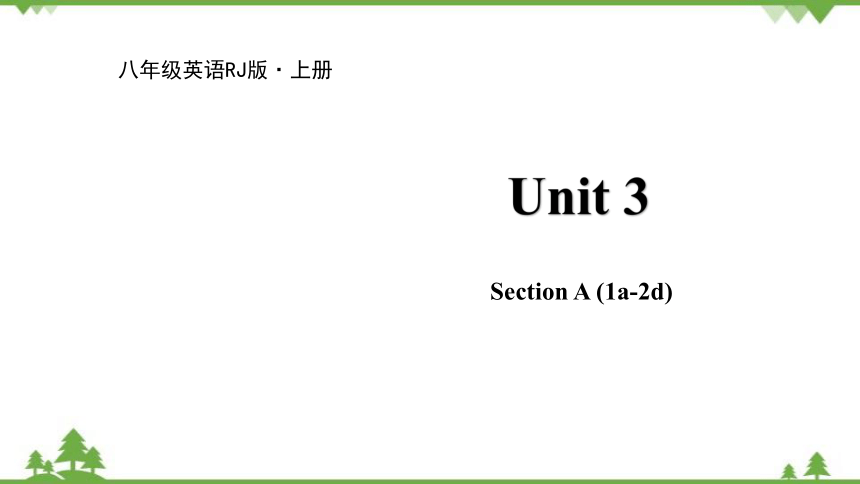 | |
| 格式 | pptx | ||
| 文件大小 | 1.6MB | ||
| 资源类型 | 教案 | ||
| 版本资源 | 人教新目标(Go for it)版 | ||
| 科目 | 英语 | ||
| 更新时间 | 2023-05-29 07:52:58 | ||
图片预览

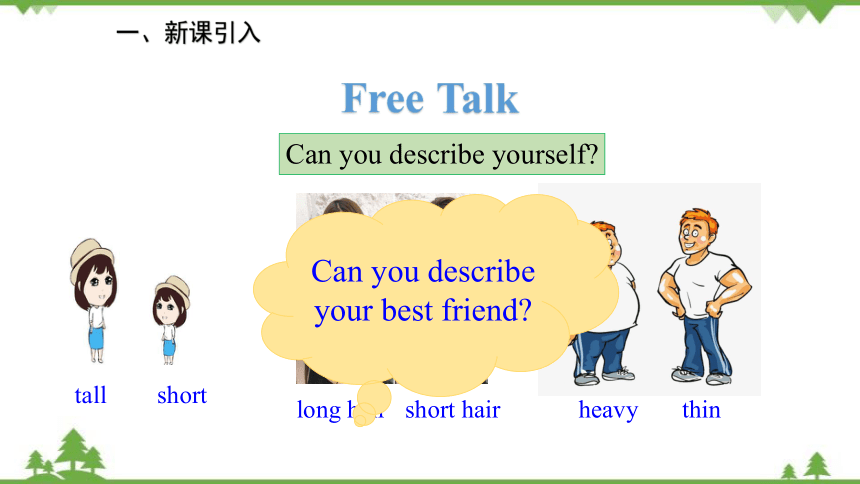
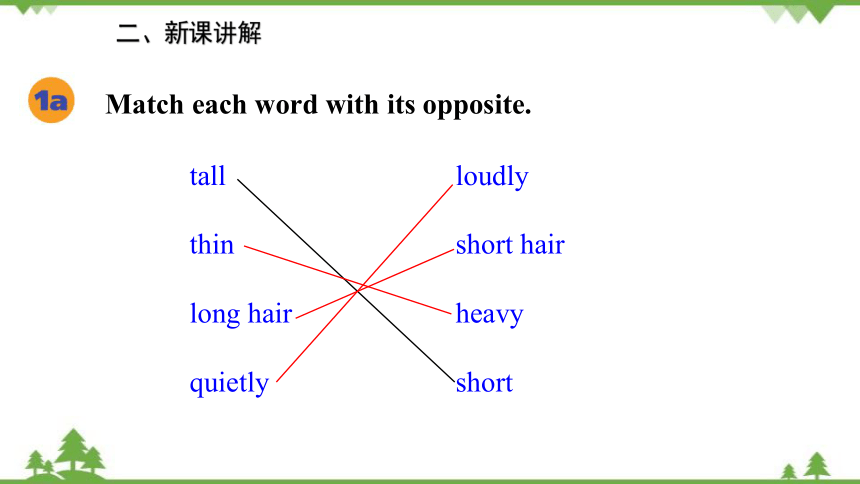
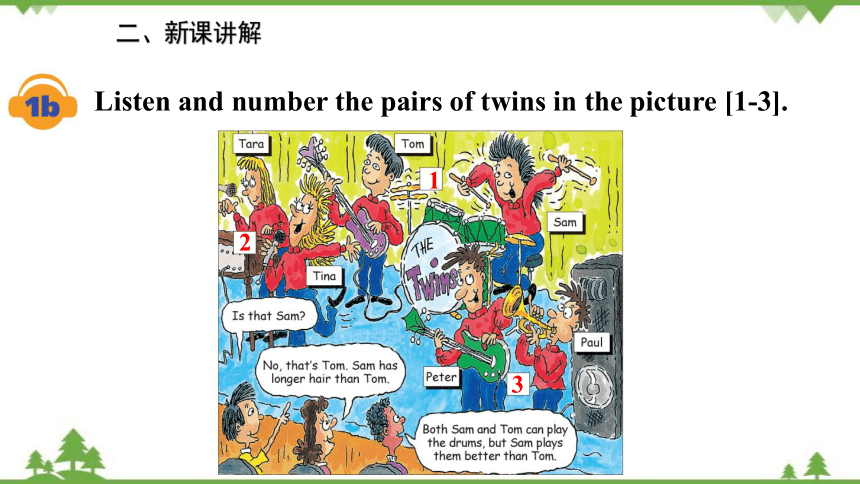
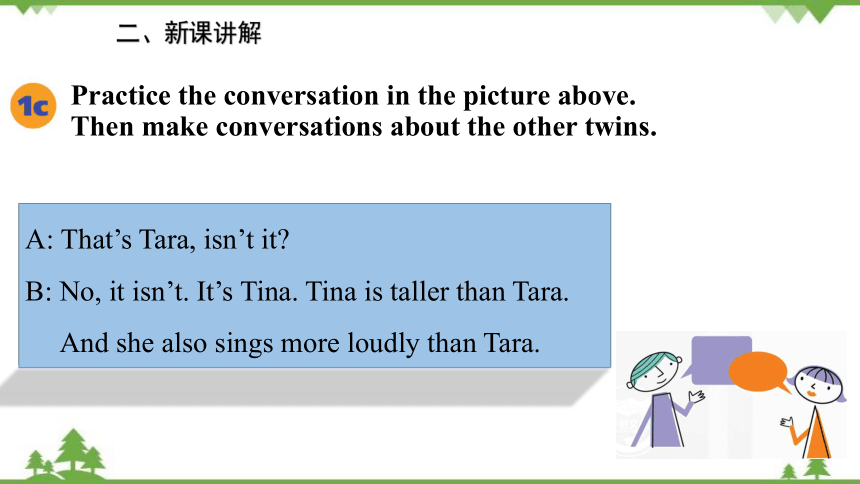
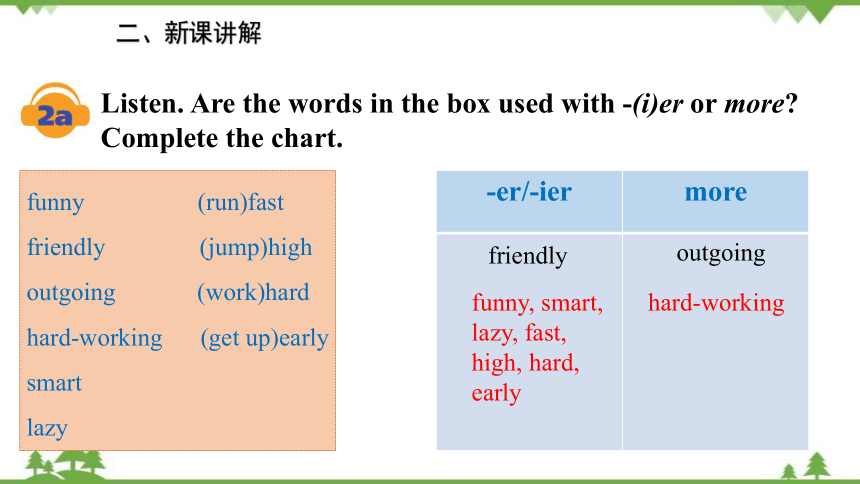
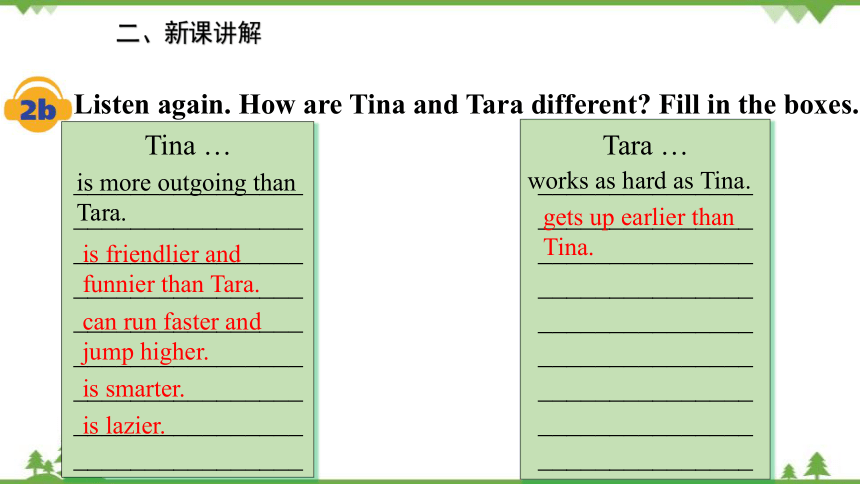
文档简介
(共19张PPT)
Unit 3
八年级英语RJ版·上册
Section A (1a-2d)
一、新课引入
Free Talk
Can you describe yourself
tall short
long hair short hair
heavy thin
Can you describe your best friend
二、新课讲解
Match each word with its opposite.
tall
thin
long hair
quietly
loudly
short hair
heavy
short
二、新课讲解
Listen and number the pairs of twins in the picture [1-3].
1
2
3
A: That’s Tara, isn’t it
B: No, it isn’t. It’s Tina. Tina is taller than Tara.
And she also sings more loudly than Tara.
二、新课讲解
Practice the conversation in the picture above.
Then make conversations about the other twins.
二、新课讲解
Listen. Are the words in the box used with -(i)er or more
Complete the chart.
funny (run)fast
friendly (jump)high
outgoing (work)hard
hard-working (get up)early
smart
lazy
-er/-ier more
friendly
outgoing
funny, smart,
lazy, fast,
high, hard,
early
hard-working
二、新课讲解
Listen again. How are Tina and Tara different Fill in the boxes.
Tina …
________________
________________
________________
________________
________________
________________
________________
________________
________________
is more outgoing than
Tara.
Tara …
_______________
_______________
_______________
_______________
_______________
_______________
_______________
_______________
_______________
works as hard as Tina.
is friendlier and funnier than Tara.
can run faster and jump higher.
is smarter.
is lazier.
gets up earlier than Tina.
二、新课讲解
Student A, look at the chart on the right. Student B, look at the chart on page 81. Ask and answer questions about Sam and Tom.
Sam Tom
smart
tall *** *
run fast
get up early *** ***
thin
funny *** *
hard-working *** *
friendly
A: Is Tom smarter than Sam
B: No, he isn’t. Sam is
smarter than Tom.
Julie: Did you like the singing competition yesterday, Anna
Anna: Oh, it was fantastic! Nelly sang so well!
Julie: Well, I think Lisa sang better than Nelly.
Anna: Oh, which one was Lisa
Julie: The one with shorter hair. I think she sang more clearly than Nelly.
Anna: Yes, but Nelly danced better than Lisa.
Julie: You can tell that Lisa really wanted to win, though.
Anna: Well, everyone wants to win. But the most important thing is to learn something new
and have fun.
二、新课讲解
Role-play the conversation.
1. both 可做形容词或代词。意为“两个,两个都”。
常用搭配:both...and... 意为“……和……都……”,用来连接两个并列的句子成分。连接两个主语时谓语动词用复数形式。
Both Tom and Jack like playing soccer. 汤姆和杰克都喜欢踢足球。
Both of them are teachers. 他们两个都是教师。
Both are wrong. 两者都是错的。
Language points
二、新课讲解
二、新课讲解
2. better 形容词good的比较级,意为“更好的”。
This picture is better than that one. 这幅画比那幅更好。
3. loudly 副词,意为“喧闹地,大声地”。
The band sings too loudly. 这个乐队唱歌声音太大了。
Someone knocked loudly at the door. 有人大声敲门。
Language points
二、新课讲解
Language points
4. hard-working 形容词,意为“工作努力的”。
She is a hard-working girl. 她是个勤奋的女孩。
辨析:hard work 名词短语,意为“艰难的工作”。
work hard 动词短语,意为“努力工作”。
5. as...as... 意为“和……一样……”。中间用形容词或副词的原级。
否定形式为 not as/so...as... 意为“不如……;和……不一样……”。
He is as tall as me. 他和我一样高。
He isn't as/so tall as me. 他和我不一样高/他不如我高。
二、新课讲解
Language points
6. with short hair 介词短语,在句子中做定语。
with意为“具有,带有……的”。
I like house with big garden. 我喜欢有大花园的房子。
另外:with 还表示“和……一起”,“用,以,借”。
Mary went shopping with her friend yesterday.
玛丽昨天和朋友去购物了。
I will open the box with the knife.
我要用刀子打开这个盒子。
7. win 动词,意为“获胜,赢得”。
He won the first prize in the competition.
他在比赛中获得了一等奖。
辨析:win 宾语通常是比赛、名次、荣誉、称号、奖品等。
beat 意为“打败”,宾语通常是人或团队,即竞争对手。
We beat their team last term. 上学期我们打败了他们队。
二、新课讲解
Language points
三、归纳小结
1. New words:
outgoing, both, better, loudly, quietly, hard-working,
competition, fantastic, which, clearly, win, though
2.Target language:
Tina is taller than Tara. She also sings more loudly than Tara.
四、强化训练
用所给单词的适当形式填空。
1. Who is ________(tall), Tom or Mary
2. Mr. Li runs ________(fast) than Mr. Song.
3. A watermelon is _________(big) than an apple.
4. I get up _________(early) than my sister.
5. Jim is __________________(hard-working) than any other student
in his class.
taller
faster
bigger
earlier
more hard-working
四、强化训练
根据汉语意思完成句子。
1. —你多久去看一次祖父母? —______ ______ do you visit your grandparents
—大约一月两次。 —About _______ a month.
2. —你通常周末做些什么? —_______ do you usually do on weekends
—我通常帮妈妈做家务。 —I ______ ______ my mother _______ housework.
3. 我爸爸一周打三次篮球。
My dad ______ ____________ three times a week.
How often
twice
What
usually help do
plays basketball
四、强化训练
改写句子。
1. Kate can play the piano. Lucy can play the piano, too.(用both合并句子)
________ Kate ________ Lucy can play the piano.
2. Tina is 160 cm and Alice is 160 cm, too.(用as...as...改写句子)
Tina is ______ __________ ______ Alice.
3. He beat his competitors in the game.(改为同义句)
He _______ the game.
Both and
as tall as
won
五、布置作业
1. Role-play the conversation in 2d.
2. Read and memorize the new words.
Unit 3
八年级英语RJ版·上册
Section A (1a-2d)
一、新课引入
Free Talk
Can you describe yourself
tall short
long hair short hair
heavy thin
Can you describe your best friend
二、新课讲解
Match each word with its opposite.
tall
thin
long hair
quietly
loudly
short hair
heavy
short
二、新课讲解
Listen and number the pairs of twins in the picture [1-3].
1
2
3
A: That’s Tara, isn’t it
B: No, it isn’t. It’s Tina. Tina is taller than Tara.
And she also sings more loudly than Tara.
二、新课讲解
Practice the conversation in the picture above.
Then make conversations about the other twins.
二、新课讲解
Listen. Are the words in the box used with -(i)er or more
Complete the chart.
funny (run)fast
friendly (jump)high
outgoing (work)hard
hard-working (get up)early
smart
lazy
-er/-ier more
friendly
outgoing
funny, smart,
lazy, fast,
high, hard,
early
hard-working
二、新课讲解
Listen again. How are Tina and Tara different Fill in the boxes.
Tina …
________________
________________
________________
________________
________________
________________
________________
________________
________________
is more outgoing than
Tara.
Tara …
_______________
_______________
_______________
_______________
_______________
_______________
_______________
_______________
_______________
works as hard as Tina.
is friendlier and funnier than Tara.
can run faster and jump higher.
is smarter.
is lazier.
gets up earlier than Tina.
二、新课讲解
Student A, look at the chart on the right. Student B, look at the chart on page 81. Ask and answer questions about Sam and Tom.
Sam Tom
smart
tall *** *
run fast
get up early *** ***
thin
funny *** *
hard-working *** *
friendly
A: Is Tom smarter than Sam
B: No, he isn’t. Sam is
smarter than Tom.
Julie: Did you like the singing competition yesterday, Anna
Anna: Oh, it was fantastic! Nelly sang so well!
Julie: Well, I think Lisa sang better than Nelly.
Anna: Oh, which one was Lisa
Julie: The one with shorter hair. I think she sang more clearly than Nelly.
Anna: Yes, but Nelly danced better than Lisa.
Julie: You can tell that Lisa really wanted to win, though.
Anna: Well, everyone wants to win. But the most important thing is to learn something new
and have fun.
二、新课讲解
Role-play the conversation.
1. both 可做形容词或代词。意为“两个,两个都”。
常用搭配:both...and... 意为“……和……都……”,用来连接两个并列的句子成分。连接两个主语时谓语动词用复数形式。
Both Tom and Jack like playing soccer. 汤姆和杰克都喜欢踢足球。
Both of them are teachers. 他们两个都是教师。
Both are wrong. 两者都是错的。
Language points
二、新课讲解
二、新课讲解
2. better 形容词good的比较级,意为“更好的”。
This picture is better than that one. 这幅画比那幅更好。
3. loudly 副词,意为“喧闹地,大声地”。
The band sings too loudly. 这个乐队唱歌声音太大了。
Someone knocked loudly at the door. 有人大声敲门。
Language points
二、新课讲解
Language points
4. hard-working 形容词,意为“工作努力的”。
She is a hard-working girl. 她是个勤奋的女孩。
辨析:hard work 名词短语,意为“艰难的工作”。
work hard 动词短语,意为“努力工作”。
5. as...as... 意为“和……一样……”。中间用形容词或副词的原级。
否定形式为 not as/so...as... 意为“不如……;和……不一样……”。
He is as tall as me. 他和我一样高。
He isn't as/so tall as me. 他和我不一样高/他不如我高。
二、新课讲解
Language points
6. with short hair 介词短语,在句子中做定语。
with意为“具有,带有……的”。
I like house with big garden. 我喜欢有大花园的房子。
另外:with 还表示“和……一起”,“用,以,借”。
Mary went shopping with her friend yesterday.
玛丽昨天和朋友去购物了。
I will open the box with the knife.
我要用刀子打开这个盒子。
7. win 动词,意为“获胜,赢得”。
He won the first prize in the competition.
他在比赛中获得了一等奖。
辨析:win 宾语通常是比赛、名次、荣誉、称号、奖品等。
beat 意为“打败”,宾语通常是人或团队,即竞争对手。
We beat their team last term. 上学期我们打败了他们队。
二、新课讲解
Language points
三、归纳小结
1. New words:
outgoing, both, better, loudly, quietly, hard-working,
competition, fantastic, which, clearly, win, though
2.Target language:
Tina is taller than Tara. She also sings more loudly than Tara.
四、强化训练
用所给单词的适当形式填空。
1. Who is ________(tall), Tom or Mary
2. Mr. Li runs ________(fast) than Mr. Song.
3. A watermelon is _________(big) than an apple.
4. I get up _________(early) than my sister.
5. Jim is __________________(hard-working) than any other student
in his class.
taller
faster
bigger
earlier
more hard-working
四、强化训练
根据汉语意思完成句子。
1. —你多久去看一次祖父母? —______ ______ do you visit your grandparents
—大约一月两次。 —About _______ a month.
2. —你通常周末做些什么? —_______ do you usually do on weekends
—我通常帮妈妈做家务。 —I ______ ______ my mother _______ housework.
3. 我爸爸一周打三次篮球。
My dad ______ ____________ three times a week.
How often
twice
What
usually help do
plays basketball
四、强化训练
改写句子。
1. Kate can play the piano. Lucy can play the piano, too.(用both合并句子)
________ Kate ________ Lucy can play the piano.
2. Tina is 160 cm and Alice is 160 cm, too.(用as...as...改写句子)
Tina is ______ __________ ______ Alice.
3. He beat his competitors in the game.(改为同义句)
He _______ the game.
Both and
as tall as
won
五、布置作业
1. Role-play the conversation in 2d.
2. Read and memorize the new words.
同课章节目录
- Unit 1 Where did you go on vacation?
- Section A
- Section B
- Unit 2 How often do you exercise?
- Section A
- Section B
- Unit 3 I'm more outgoing than my sister.
- Section A
- Section B
- Unit 4 What's the best movie theater?
- Section A
- Section B
- Unit 5 Do you want to watch a game show?
- Section A
- Section B
- Unit 6 I'm going to study computer science.
- Section A
- Section B
- Unit 7 Will people have robots?
- Section A
- Section B
- Unit 8 How do you make a banana milk shake?
- Section A
- Section B
- Unit 9 Can you come to my party?
- Section A
- Section B
- Unit 10 If you go to the party, you'll have a grea
- Section A
- Section B
